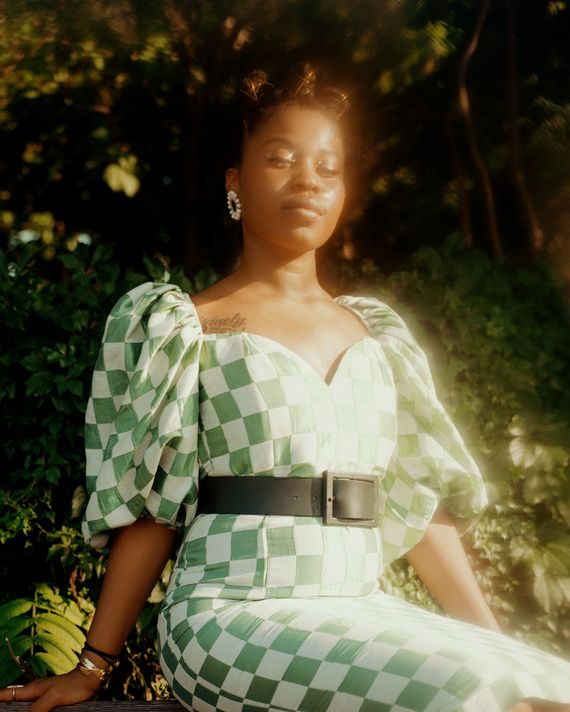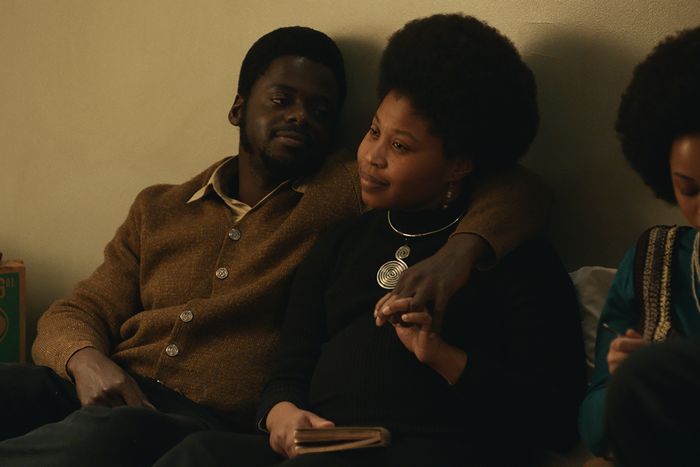
There’s a moment in Judas and the Black Messiah where two lovers face each other, alone in a room and suspended in time in the midst of revolution. In this moment, nobody has ever been younger or more in love than these two. Deborah Johnson (who now goes by Akua Njeri), played by Dominique Fishback, opens a journal and reads a poem to deputy chairman of the Illinois Black Panther Party Fred Hampton (Daniel Kaluuya). We listen and watch him watch her with love.
The poem is an original by Fishback, but it belongs to Deborah. The love story is a true story made fictional, and though we know how it will end, this poem and its reassurances feel like the most important truth in this moment, a gift.
Over Zoom, Fishback is equally effusive and thoughtful, careful with her words but never spare with them. The 29-year-old actor, writer, poet, and self-proclaimed “Jessica Day of the Hood” (she’s a big New Girl fan) has a natural aptitude for seemingly everything. She was her high school’s valedictorian, captain of its basketball team, and homecoming queen. Her first professional audition was for an HBO miniseries, Show Me a Hero, with David Simon, which she got and later led to Simon writing the part of Darlene for her in The Deuce.
If it all sounds so perfectly fortunate, you should know that the work has been work. In March, Fishback will turn 30 and will have officially been involved in the entertainment industry in some way for half of her life. As a teenager, she was a part of the MCC Youth Company, an after-school theater program in New York that allowed kids to write and perform original work. “That’s when I started figuring out that I was a poet and began to really find my light on stage.”
Even before she had an audience or a concentrated artistic outlet, she was staying up late, admiring Lucille Ball’s physical comedy in I Love Lucy, and writing in her journal about the different ways she would have played scenes in Sister, Sister. In 2014, she debuted a one-woman show, Subverted, that was nominated for a New York Innovative Theater Award and in which she played 22 distinct characters. And, before she received an email from director Shaka King offering her a role in Judas and the Black Messiah “if she wanted it,” she was writing her own pilot for a Black Panther-esque Romeo and Juliet romance.
“Acting is a part of my purpose as a storyteller, but I need to tell my own story too,” she says. “I have to write and create from my own experience to help other people see themselves.” Now, she is playing one part of the real-life pair of star-crossed lovers.
The film follows the FBI informant (Lakeith Stanfield) who helped the bureau carry out the assassination of chairman Fred, a contained period of time onscreen which overlaps with his blossoming relationship with Deborah. It’s real, and it’s dark, this collision of life, death, and more life — Deborah is pregnant at the time of the chairman’s assassination — and yet there is an undeniable light contained in the story of this young love. Who but a poet could wrangle the darkness and deliver us that light?
“I wrote the poems in Judas and the Black Messiah as Deborah,” says Fishback. “Poems about his dimples, poems about their first kiss. Journal entries of things that we don’t get to see in the film.”
You won’t hear all of these poems in the film either, most of them belong only to Deborah, but the process of creating them was an important part of Fishback’s interpretation of this part of the story. “I wanted to make sure she was fully realized outside of the Black Panther Party and outside of [chairman Fred].”
In real life, Akua stopped writing poetry when she first met the chairman, but for the movie, Deborah, who was only 19 at the time of the assassination, keeps a journal. Originally a prop, the journal has become a talisman. Even now, it’s still with Fishback. During our Zoom, she flips through its pages, showing drawings, clippings from newspapers and magazines, pages of girlish bubble-letter declarations opposite pages of longhand.
Fishback plays Deborah with strength, softness, and care. Being a part of an on-set community that practiced mutual care and respect for each other allowed Fishback to access a deeper level of trust, understanding, and freedom in her work, which allowed her to harness energy she hadn’t felt in awhile. “When I first started doing television and film, I stopped writing poetry and I felt blocked,” she says. The care she felt on set helped her move past that block, something that was crucial for her to embody the character. “Deborah had such a trust and love for chairman Fred. I knew that I couldn’t be blocked to embody that.”
In her first moments alone with the chairman as Deborah, she is bold, teasing him for his shyness; after his release from prison, she quietly reveals her pregnancy; and, just like Akua did in real life, Deborah covers the chairman’s body with her own pregnant body through a hailstorm of police bullets.
“I’ve had my share of police terrorism,” says Fishback. “I don’t have to imagine what it’s like to hear gunshots in close range: I know what it’s like. Sometimes we think ‘Why did I have to experience XYZ?’ I always look at it as just more insight into the characters that I’m supposed to embody. I pray to be a vessel for spirit and energy to flow through.”
Beyond using past experiences to inform her performance, the on-set environment helped her highlight and bring her own love to the story of Deborah and chairman Fred. “I learned unconditional love on a personal and professional level from this cast and crew, and my poetry suddenly became love poems, soft poems,” she says, sounding surprised. “I’m Brooklyn always, I never imagined that all the poems I’d be writing would be so soft and whimsical.”
Next up, Fishback has her sights set on romance, comedy, and fantasy (Lucasfilm: Call her for the Children of Blood and Bone adaptation!) There’s more writing to be done, too. And an Instagram book club to run. Maybe even music eventually. “As a writer, I’ve never wanted to say I was just one thing,” she says. “If I can take what I’m learning right now and help other women as I’m evolving, then I can pay it forward.”
With half a lifetime spent working toward this moment, her continued evolution proves that one thing will never be enough to define her. From theater kid to writer to poet to actor, whatever her light catches comes alive in her glow. How lucky for us that as witnesses to her light, we get to be in on that shine now, too.





